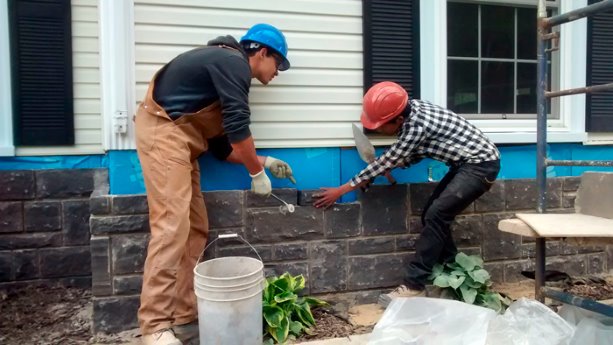Seven newcomers to Canada are plying their bricklaying skills with masonry contractors in and around Fredericton, N.B. through a pre-apprenticeship pilot program that incorporates practical language skills into the curriculum.
The idea is to teach them not just how to conjugate their verbs but also how to use "action-based words" and phrases they will need to know on the jobsite, says Lori Leach, the strategic manager of apprenticeship and occupational certification at the New Brunswick Department of Post-Secondary Education, Training and Labour.
By incorporating practical-based language training into the class, the program sets a new path in trades training, a direction other trades trainers might be wise to adopt to take advantage of a growing pool of non-English speaking newcomers with potential trade skills.
Of the seven participants in the trade program at New Brunswick Community College (NBCC) in Fredericton, three are Syrian, two are Bhutanese, one is Russian and one is from Columbia.
Day one what they all had in common was they spoke little English — a problem because an admission requirement for students in traditional trades training is high functioning English.
Leach’s alternative model, however, opens the door to people with less English but who have experience or aptitude for the trade.
"Teaching has been hands-on, instead of paper-based, so they could see it, feel it, touch it," Leach points out.
As an example, videos from YouTube were among the teaching methods employed in class.
"We stayed away from the barriers that traditional language training might create," she adds.
Leach says each participant’s English skills continue to be measured on the jobsite.
"The research component is asking, ‘can we, through this alternative delivery model, teach language training while doing job readiness for a skilled trade?’"
The pre-apprenticeship program was launched when the Multicultural Association of Fredericton, commonly known as "the starting place for refugees in the province," approached the NBCC about an influx of refugees with building trades experience. Last fall the two formed a partnership with Leach’s department to develop the program.
Initially, about 30 newcomers showed interest. To identify the best candidates, each applicant was required to demonstrate their skill level or aptitude in a practical setting with bricks, mortar and the tools of the trade.
One applicant with 30 years of masonry experience from his country "picked the mortar up with his hand and flicked it onto the bricks," says Leach. While he was advised to use a trowel to apply mortar, the applicant chose to continue to do it by hand, "proudly illustrating" a skillset learned and practiced for years overseas.
The seven successful participants spent the next few months in class. Bricklaying, safety training and "essential skills," such as working with others and problem solving, were part of the curriculum, says Leach.
The participants have been placed in jobs with local masonry contractors and paid a New Brunswick government-subsidized rate of $11 an hour, topped up to $14 an hour by their employers.
Roughly three weeks into their four-month employment training block, feedback from their bosses has been "phenomenal," says Leach.
On one jobsite where a supervisor was late one day, a pair of participants showed the initiative to tackle the job at hand, rather than sit and wait for instruction.
"When the boss arrived, he was so impressed," she says, adding it is situations like this that have prompted some employers to give their new workers raises.
Leach says in a short time on the job the participants have shown "a level of preparedness" to qualify for registration in the apprenticeship program. One participant has proven ready to challenge the certification exam to qualify as a journeyperson — a result of his experience overseas.
"We will be providing him with a mini-upgrade course to make sure he knows the language and the theory associated with our certification exam," she states.
Leach says 55 per cent of bricklayers in New Brunswick are 45 or older.
"We know a shortage is coming so we need to think about (training) the future generation."
As the pre-apprenticeship training model moves forward, "we want to roll it out in other regions and maybe even in other provinces and into other trades," she says, adding Saint John is first on the list.




Recent Comments
comments for this post are closed